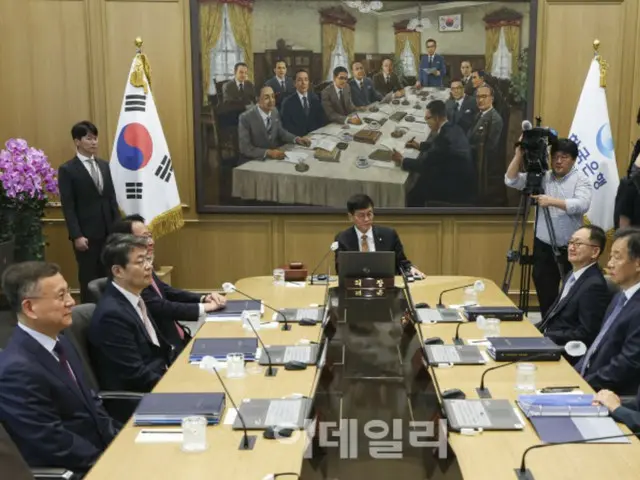The Monetary Policy Committee has decided to keep interest rates unchanged for a record 18 months since the policy was first adopted. Experts expect the Monetary Policy Committee to keep the base interest rate at 3.5% at its plenary session on the 11th.
If things go as planned, it will mark the 12th consecutive year that the base interest rate will remain unchanged since February last year, breaking the record for the longest period of interest rate freezes in history.
Prior to this, a survey was conducted among 12 analysts from securities firms and researchers from economic research institutes in South Korea.
As a result of the survey, 11 members of the Monetary Affairs Committee unanimously predicted that interest rates would remain unchanged. Although price indicators are showing a gradual slowdown, prices are not converging to meet the Bank of Korea's target value.
In other words, it is too early to judge whether the dollar/won exchange rate will continue to rise, i.e., whether prices are heading toward a stable trend.
There are also uncertainties that could stimulate price increases, such as the impact of the impact of the economic downturn. In particular, there is a lot of concern about the gap in base interest rates with the United States. If the Fed were to lower interest rates before the Fed,
The current exchange rate, which is currently in the high 1,300 won range, is likely to rise sharply. The recent trend of rising household debt is also expected to be a factor in holding back the Bank of Korea's interest rate stance.
Household loans from the banking industry increased by 6 trillion won (US$6.5 billion) in May for the first time in seven months, and recorded another 6 trillion won increase last month.
The amount is 20.5 trillion won (US$23.9 billion), showing the largest increase in three years. The second stage of the stressed debt-to-equity ratio (DSR) that the financial authorities had planned for this month is
The decision to delay the implementation of the tax cuts by two months is raising concerns that this will lead to an increase in household debt, particularly home equity loans.
Will minority opinions be raised at this Financial and Monetary Affairs Committee meeting?
The survey results are expected to be a barometer for predicting the timing of interest rate cuts in the second half of the year. According to the survey results, nine out of 12 experts said they would consider raising the base interest rate at this Monetary Policy Committee meeting.
Six out of nine people who predicted a minority opinion would emerge expecting the Bank of Korea to begin lowering interest rates during the third quarter.
The reason for the rising prospect of an interest rate cut is the slowdown in inflation. The consumer price inflation rate from April to June remained at the 2% level for three consecutive months. The consumer price inflation rate in June was 2.
At a press conference following a meeting of the Monetary Policy Committee in May, Governor Lee said, "The inflation rate is expected to slow down in the coming months."
At the meeting, he said, "If the trend (of inflation rate in the second half of the year) continues to decline from 2.3% to 2.4%, we will be able to consider lowering interest rates."
Cho Yong-gu, a researcher at Shinyoung Securities, said in May that a committee member who expressed a dovish (monetary easing) opinion in the minutes of the Financial and Monetary Affairs Committee
"There is a possibility that one of the two will express the minority opinion that interest rates will be lowered in July, citing the slowdown in inflation," said Kim Sang-hoon, a researcher at Hana Securities.
He said that one of the members of the Financial and Monetary Affairs Committee may call for an interest rate cut, and if the other two members call for an interest rate cut, the view that the Bank of Korea will begin to lower interest rates as early as next month will strengthen.
On the other hand, some analysts say it is too early for the Monetary Policy Committee to recommend lowering interest rates.
"I expect that the economy will slow down and that the Bank of Japan will consider the possibility of lowering interest rates," he said. However, he added, "There may be a minority opinion that the economic downturn is not severe enough to warrant an immediate interest rate cut."
Yang Jae-gyun, a researcher at KB Securities, also said, "There is a 40% chance that a minority opinion will be expressed at the Monetary and Monetary Affairs Committee meeting in July, and a 60% chance that it will not be expressed, so the odds are still low."
"It's more likely that no opinion will be issued." The slowdown in consumer price growth in June could be a reason to lower interest rates, but second-quarter growth figures to be released on the 25th are yet to be released.
The reasoning is that it would be difficult to argue for a cut in interest rates before that happens.
2024/07/11 07:12 KST
Copyrights(C) Edaily wowkorea.jp 107

